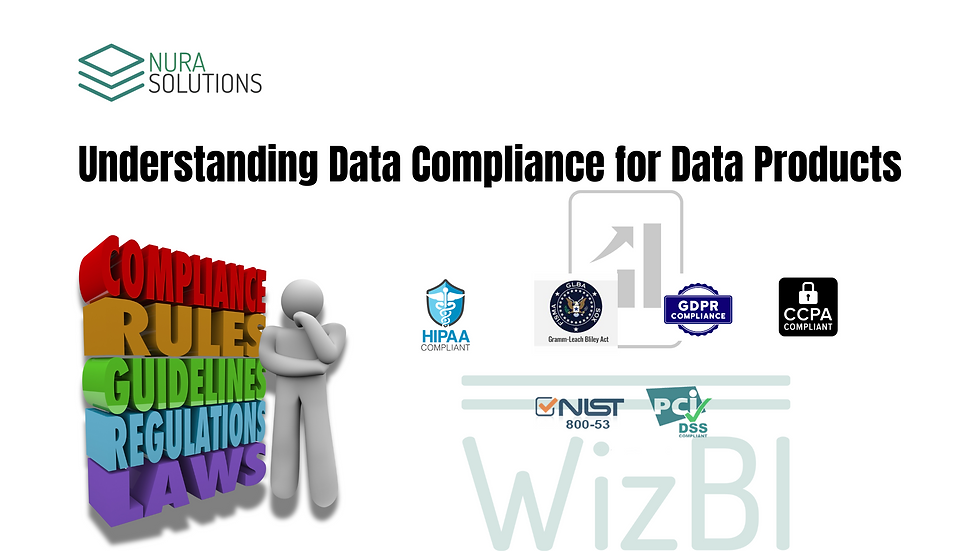Understanding Data Compliance for Data Products
- Nura Solutions
- May 16, 2024
- 3 min read
In the digital age, data is a critical asset for businesses, driving decision-making and innovation. However, with the increasing reliance on data comes the responsibility to manage it in compliance with various regulations and standards. This article delves into the concept of data compliance, its importance, and the key regulations that data products must adhere to.
What is Data Compliance?
Data compliance refers to the adherence to legal and regulatory requirements, industry standards, and internal policies related to the collection, storage, processing, and sharing of data. It encompasses a broad range of activities, including ensuring data accuracy, providing transparency about data rights, protecting sensitive information, and managing data throughout its lifecycle.
Why is Data Compliance Important?
Data compliance is crucial for several reasons:
- Legal Obligations: Non-compliance can result in significant fines, legal penalties, and reputational damage.
- Trust and Reputation: Responsible data handling builds customer trust and maintains a company's reputation.
- Data Breach Protection: Compliance often involves strong security measures to protect against cyberattacks.
- Risk Management: Identifying and managing risks associated with data handling can enhance operational efficiency.
- Competitive Advantage: Companies that demonstrate strong data compliance can differentiate themselves, especially if customers prioritize data privacy.
Key Data Compliance Regulations
Several regulations have been established to ensure data compliance. Some of the most common include:
1. General Data Protection Regulation (GDPR): Enforced by the European Union (EU), the GDPR is a comprehensive privacy law that grants consumers rights over their personal data. It emphasizes transparency, consent, and data protection.
2. Health Insurance Portability and Accountability Act (HIPAA): In the United States, HIPAA ensures the privacy and security of protected health information (PHI). It applies to healthcare providers, insurers, and related entities.
3. California Consumer Privacy Act (CCPA): The CCPA provides California residents with control over their personal information. It requires businesses to disclose data practices and allows consumers to opt out of data sales.
4. Gramm-Leach-Bliley (GLB) Act: This U.S. law focuses on financial institutions and requires them to protect consumers' non-public personal information. It covers banking, insurance, and securities firms.
5. Federal Trade Commission (FTC): Although not a specific regulation, the FTC enforces data privacy and security through its authority to address unfair and deceptive practices. It plays a significant role in protecting consumer data.
6. Personal Data Protection (PDP) Bill (India): India's proposed data protection legislation aims to safeguard personal data and includes provisions for a Data Protection Board. It will replace existing rules once passed.
7. Digital Personal Data Protection (DPDP) Bill (India): Recently unveiled in India, this comprehensive draft bill covers both personal and non-personal data. It will replace the current Information Technology (Reasonable Security Practices and Procedures and Sensitive Personal Data or Information) Rules, 2011.
8. Information Technology Act, 2000 (India): In the absence of a distinct data protection law, the IT Act, along with the Information Technology (Reasonable Security Practices and Procedures and Sensitive Personal Data or Information) Rules, 2011, has been crucial for data protection in India.
Remember that compliance with these regulations is essential for maintaining trust, avoiding penalties, and protecting sensitive data. Organizations should stay informed and adapt their practices accordingly.
Implementing Data Compliance in Data Products
To ensure data compliance, organizations must take a proactive approach, which includes:
- Understanding Applicable Regulations: Being aware of the regulations that apply to their industry and region.
- Data Governance Framework: Establishing a framework for managing data that aligns with compliance requirements.
- Security Measures: Implementing security solutions like encryption, access controls, and regular security audits.
- Employee Training: Educating employees about compliance policies and the importance of data security.
- Regular Audits and Assessments: Conducting regular audits to ensure ongoing compliance and address any gaps.
Conclusion
Data compliance is an integral part of managing data products. It not only helps in adhering to legal requirements but also plays a vital role in protecting the organization's data assets, building customer trust, and maintaining a competitive edge. As data continues to grow in volume and value, the importance of data compliance will only increase, making it essential for organizations to invest in robust data compliance strategies.
For more detailed insights into data compliance and how it can be implemented within your organization, exploring resources such as IBM's guide on data compliance or Digital Guardian's overview of top regulations can be beneficial.





Comments